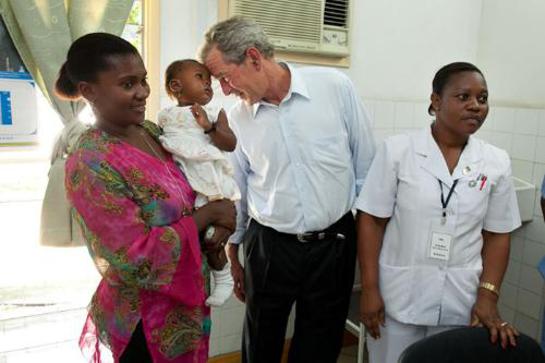During a visit to the George Urban Health Center in Lusaka last week, President George W. Bush, Mrs. Laura Bush and First Lady of Zambia Dr. Christine Kaseba were joined by United States Ambassador Mark Storella to announce that Zambia will be the first Pink Ribbon Red Ribbon partner country, expanding the availability of vital cervical cancer screening and treatment, and breast care education to those in need.

Credit/Copyright: George W. Bush Institute
Pink Ribbon Red Ribbon is an innovative partnership between the George W. Bush Institute, the U.S. Department of State President’s Emergency Plan for AIDS Relief (PEPFAR), Susan G. Komen for the Cure and the Joint United Nations Programme on HIV/AIDS (UNAIDS) that leverages public and private investments and existing health infrastructures to combat cervical and breast cancer, the two leading causes of cancer deaths among women in Sub-Saharan Africa. The cervical cancer partnership will utilize the platform and resources at PEPFAR and will draw from lessons learned in the significant scaling-up of access to HIV interventions in recent years.
“Today I’m proud to announce that Zambia is the first country to implement a new effort to combat cervical and breast cancer in the developing world,” said President Bush. It’s not acceptable to save a woman’s life from HIV/AIDS and watch her die from cervical cancer."
Joining President and Mrs. Bush, Dr. Kaseba and Ambassador Storella were Sr. Joseph Kasonde, Minister of Health, Zambia; Gary Cohen, Executive Vice President, Becton Dickinson; Katrina McGhee, Executive Vice President and Chief Marketing Officer, Susan G. Komen for the Cure; Dr. Sheila Tlou, Regional Director, UNAIDS and Dr. Julie Gerberding, President, Merck Vaccines.
Ambassador Storella said, “Zambia has the flagship program for screening and early treatment of cervical cancer in Africa. This additional funding and the support of the Government of Zambia will help prevent the terrible suffering due to cervical cancer across the country through prevention, early detection and treatment.”
PEPFAR will contribute an additional $3 million U.S. dollars, and the Zambian Ministry of Health will dedicate nurses and clinic space to perform simple screening to highlight potential cancers at an early stage, when they can be treated on the spot before they progress.
The University Teaching Hospital Department of Obstetrics and Gynecology, supported by the Centre of Infectious Disease Research, Zambia (CIDRZ) and the U.S. Centers for Disease Control and Prevention (CDC), developed a program in 2005, to train nurses to perform a visual inspection technique and to take a picture of the cervix using a simple digital camera. This way it is possible to see even small lesions, and the findings can be confirmed by an expert panel.
In addition, the Ministry of Health, in collaboration with the Ministry of Education, will pilot vaccination of fourth-grade girls against Human Papilloma Virus (HPV), the cause of nearly all cervical cancer.
An initial donation of Gardasil HPV vaccine was made by Merck Inc., one of the Pink Ribbon Red Ribbon corporate partners. The Ministry will seek to expand this program to reach high-risk districts through a program of vaccination and prevention messages. Susan G. Komen for the Cure, in partnership with Merck, will invest approximately $1.5 million over three years for cervical and breast cancer community sensitization and mobilization activities in Zambia. All activities will be under the direction and in partnership with the ministry of health and will be integrated as part of their efforts at a comprehensive cancer control plan. BD (Becton, Dickinson and Company), another Pink Ribbon Red Ribbon corporate partner, will assist in supporting the School of Medicine in training in pathology and cytology.
Pink Ribbon Red Ribbon has commitments of $75 million over five years, and is expected to grow to include additional participants and services. The goals are to reduce deaths from cervical cancer by an estimated 25 percent among women screened and treated through the initiative, significantly increase access to breast and cervical cancer prevention, screening and treatment programs, and create innovative models that can be scaled up and used globally.





